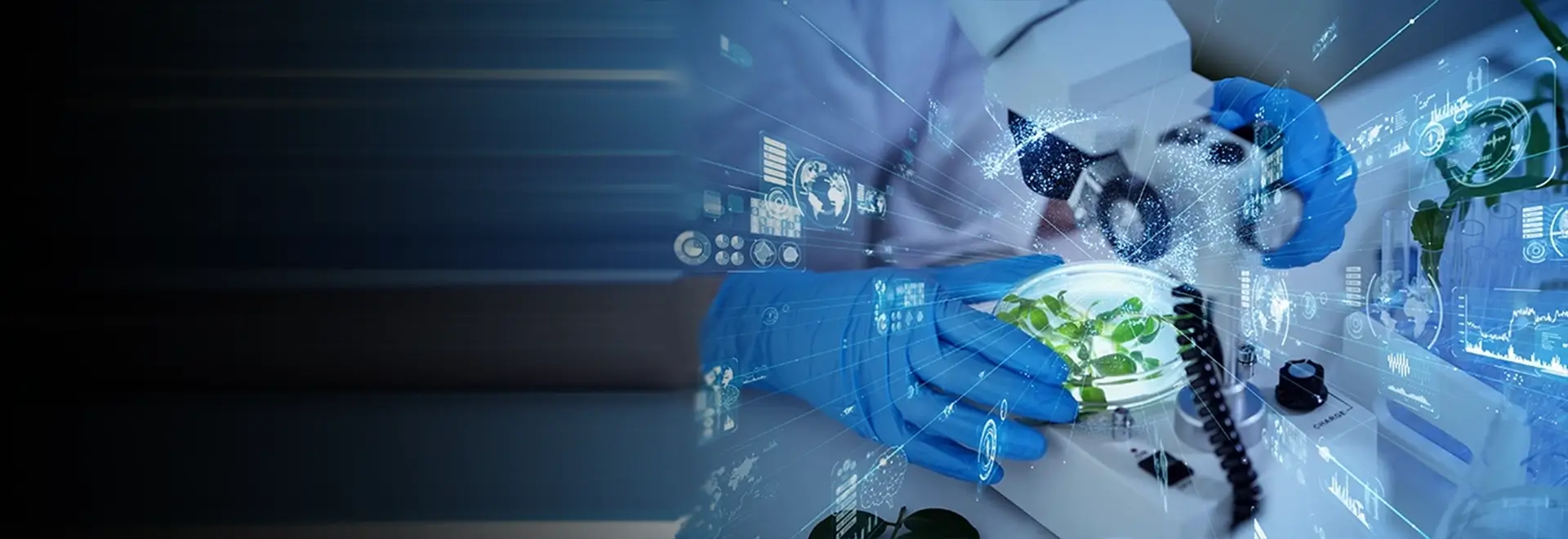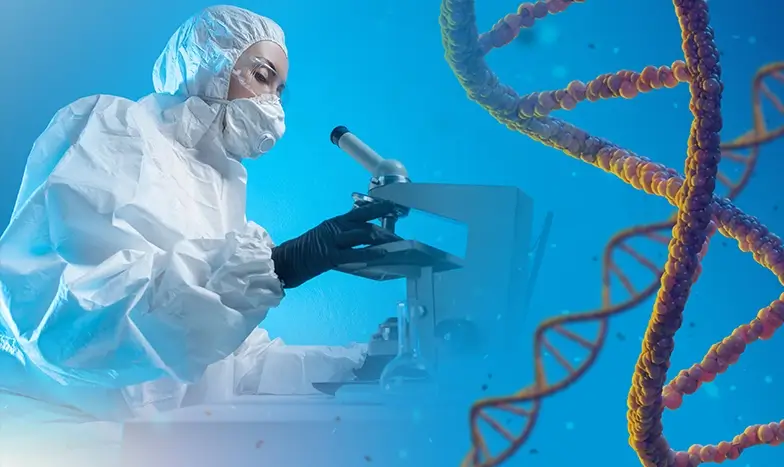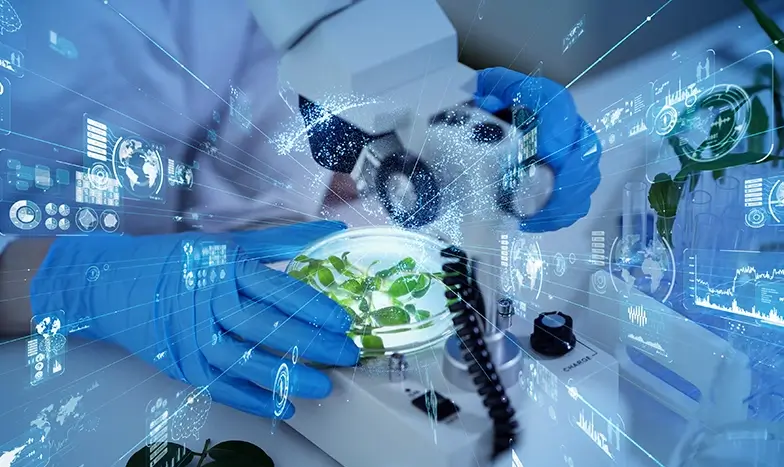B.Tech. Biotechnology
Program Details
The B.Tech. Biotechnology program offered by UPES's School of Health Sciences and Technology is designed to provide students with a comprehensive understanding of the field and prepare them for careers in biotechnology. The four-year program consists of 160 credits and encompasses theoretical coursework, laboratory practicals, projects, and industrial trainings. The curriculum of the program is carefully crafted to cover a range of subjects that are essential to biotechnology. Students study core subjects such as biochemistry, cell biology, microbiology, molecular biology, genetics, genetic engineering, bioprocess engineering, downstream processing, cancer biology, and drug discovery and development. Additionally, the program offers skill-based vocational courses in areas like data analysis, simulations, big data analytics, machine learning, bioinformatics, systems biology, and computational biology. This combination of core and skill-based courses provides students with a strong foundation in the fundamentals of biotechnology and equips them with industry-relevant skills.
Practical laboratory training is an integral part of the program. Students gain hands-on experience in various techniques and experiments related to molecular biology, microbiology, protein purification, fermentation, genomics, and proteomics. This practical training enables them to develop essential laboratory skills and familiarize themselves with state-of-the-art equipment and techniques. To enhance the students' exposure to real-world applications and technologies, the program organizes industrial and institutional visits to biotechnology companies, research organizations, and academic institutes. These visits offer students insights into the industry practices and current advancements in biotechnology. Additionally, students are encouraged to undertake internships in industries or research laboratories to gain practical experience and further strengthen their understanding of the field.
UPES supports undergraduate students in engaging in research projects through grants like SHODH, providing financial assistance of Rs. 50,000/-. Students have the opportunity to work on research projects in their areas of interest under the guidance of faculty members. They also have access to research facilities and receive guidance in data analysis, interpretation, and thesis support through regular interactions with mentors. To foster a culture of learning and knowledge exchange, the program organizes various academic events such as journal clubs, seminars, workshops, and conferences. These events bring together experts, professionals, and students to share their research work, discuss emerging trends, and explore interdisciplinary aspects of biotechnology.
Program Highlights
- Our world-class lab is equipped with state-of-the-art instruments and technologies, enabling students to perform complex analyses with precision and efficiency.
- Our lab offers dedicated areas tailored to specific research needs, such as molecular biology, protein analysis, cell culture, genomics, and bioinformatics, providing an optimal environment for conducting experiments and fostering collaboration.
- Our lab infrastructure promotes collaboration among students from different scientific disciplines, with shared meeting spaces, discussion areas, and collaborative workstations, bridging the gap between diverse research fields.
- Safety is our utmost priority, and our lab adheres to strict biosafety protocols. We maintain a controlled environment with advanced safety features, ensuring the well-being of students and the integrity of their experiments.
- In addition to physical resources, our lab offers comprehensive support and training. Experienced staff provide guidance on instrument operation, experimental design, data analysis, and troubleshooting through workshops, seminars, and hands-on training sessions.
- This program, in collaboration with the University of Queensland, allows students to undertake 3.5 years of undergraduate study at UPES, followed by 2 years of Masters at the University of Queensland in Australia, offering a global learning experience and expanding opportunities for advanced education.
Future Scope / Industry Trends
The future scope of B.Tech Biotechnology programs is promising, with diverse opportunities in various industries. Graduates can capitalize on the rapidly evolving field of biotechnology and its applications. The healthcare and pharmaceutical sectors offer substantial prospects, with demand for professionals skilled in biotechnology due to the development of innovative drugs, personalized medicine, gene therapies, and biopharmaceuticals. Additionally, agricultural biotechnology presents opportunities in crop improvement, GMOs, biofertilizers, and biopesticides. Industrial biotechnology involves applications in biofuels, biomaterials, bioremediation, and bioprocessing. The field of bioinformatics combines biology and data analysis, offering roles in genomics, proteomics, drug discovery, and biological research. Environmental biotechnology addresses waste management, pollution control, and conservation, with roles in bioremediation, wastewater treatment, and environmental monitoring. Entrepreneurship is also an option, with graduates establishing biotech startups focusing on precision medicine, synthetic biology, agriculture, or personalized healthcare. Higher studies and research careers in academia and research institutions are viable paths, contributing to cutting-edge research in areas like cancer biology, stem cells, regenerative medicine, and genetic engineering.
Career Opportunities
B.Tech Biotechnology graduates have a wide range of career opportunities in diverse sectors. They can pursue a career as Research and Development Scientists, working in research organizations, pharmaceutical companies, or biotech firms. In these roles, they conduct research, develop new products, and contribute to advancements in areas like drug discovery, genetic engineering, or agricultural biotechnology. Another career path for B.Tech Biotechnology graduates is as Bioprocess Engineers. They specialize in designing and optimizing bioprocessing techniques for the large-scale production of biopharmaceuticals, enzymes, biofuels, and other bioproducts. Industries such as pharmaceuticals, food processing, or bioenergy offer opportunities for Bioprocess Engineers to apply their expertise.
Listed below are the potential professional paths available for students in the field of Biotechnology that they can pursue.
- Regulatory Affairs Associate
- Quality Assurance Specialist
- Bioinformatics Specialist
- Entrepreneurship and Startups
- Environmental Biotechnologist
- Academic Teaching Positions
Placements
The B.Tech. Biotechnology program offered by UPES School of Health Sciences and Technology provides excellent placement opportunities for its graduates. The program combines a strong foundation in biotechnology principles with hands-on training in cutting-edge technologies and industry-relevant skills. UPES has established collaborations with leading biotechnology companies and research institutes, ensuring that students gain exposure to the latest advancements in the field. The dedicated placement cell at UPES facilitates internships and job placements, connecting students with reputed organizations in the biotechnology sector. With a comprehensive curriculum, industry-oriented training, and a robust network of industry partners, the placements of the B.Tech. Biotechnology program at UPES School of Health Sciences and Technology are highly promising, enabling students to embark on successful careers in this rapidly evolving field.
Fee Structure
Click here for detailed Fee Structure.
Eligibility
Interested students must meet the following minimum eligibility criteria for B.Tech. Biotechnology: Minimum 50% Marks at X & XII with Physics, Chemistry, Biology/ Math’s, and English as a Major Subject in XII
Selection Criteria
Selection criteria for individuals interested in pursuing B.Tech. Biotechnology at UPES rely on their individual performance in UPESEAT / JEE Mains / Board Merit / SAT/CUET.
Curriculum
Curriculum 2024-2028
Semester 1
| Course | L | T | P | Credit |
|---|---|---|---|---|
| Chemistry | 2 | 1 | 1 | 4 |
| Physics | 2 | 1 | 1 | 4 |
| Mathematics I | 2 | 1 | 0 | 3 |
| Introduction to Biotechnology | 2 | 1 | 1 | 4 |
| Introduction to IT systems for Health Sciences | 2 | 0 | 1 | 3 |
| Living Conversations | 2 | 0 | 0 | 2 |
| Environment Sustainability & Climate Change | 2 | 0 | 0 | 2 |
| TOTAL | 22 |
Semester 2
| Course | L | T | P | Credit |
|---|---|---|---|---|
| Mathematics II | 2 | 1 | 0 | 3 |
| Basic Electrical and Electronics Engineering | 2 | 0 | 0 | 2 |
| Workshop Practices | 1 | 0 | 1 | 2 |
| Engineering Graphics | 1 | 0 | 1 | 2 |
| Engineering Thermodynamics | 2 | 1 | 0 | 3 |
| Biostatistics | 2 | 0 | 0 | 2 |
| Biochemistry | 2 | 1 | 1 | 4 |
| Social Internship | 0 | 0 | 0 | 0 |
| Critical Thinking and Writing | 2 | 0 | 0 | 2 |
| Environment Sustainibility & Climate Change (Living Lab) | 2 | 0 | 0 | 2 |
| Technologies of the Future | 2 | 0 | 0 | 2 |
| TOTAL | 24 |
Semester 3
| Course | L | T | P | Credit |
|---|---|---|---|---|
| Cell Biology | 2 | 1 | 1 | 4 |
| Microbiology & Microbial Technology | 2 | 0 | 1 | 3 |
| Molecular Biology and Genetics | 2 | 1 | 1 | 4 |
| Exploratory 1 | 3 | 0 | 3 | |
| Design Thinking | 2 | 0 | 0 | 2 |
| TOTAL | 16 |
Semester 4
| Course | L | T | P | Credit |
|---|---|---|---|---|
| Immunology & Immunotechniques | 2 | 1 | 1 | 4 |
| Bioprocess Engineering | 2 | 0 | 1 | 3 |
| Heat and Mass transfer | 2 | 0 | 1 | 3 |
| Bioinformatics & Computational Biology | 2 | 0 | 1 | 3 |
| Biophysics | 2 | 0 | 0 | 2 |
| Exploratory 2 | 3 | 0 | 0 | 3 |
| Working With Data | 2 | 0 | 0 | 2 |
| EDGE-SoftSkills | 0 | |||
| Government/NGO/Startup Internship | 0 | 0 | 0 | 0 |
| TOTAL | 20 |
Semester 5
| Course | L | T | P | Credit |
|---|---|---|---|---|
| Genetic Engineering & Genomics | 2 | 1 | 1 | 4 |
| System Biology | 2 | 0 | 1 | 3 |
| Downstream Processing | 2 | 0 | 1 | 3 |
| Bioanalytical Techniques | 2 | 1 | 1 | 4 |
| Project I | 0 | 0 | 1 | 1 |
| Exploratory 3 | 3 | 0 | 0 | 3 |
| EDGE – Advance Communication | 0 | |||
| Leadership & Teamwork | 2 | 0 | 0 | 2 |
| TOTAL | 20 |
Semester 6
| Course | L | T | P | Credit |
|---|---|---|---|---|
| Molecular & Nano Diagnostics | 2 | 0 | 1 | 3 |
| Data analysis and simulations | 2 | 0 | 1 | 3 |
| Environmental Biotechnology | 2 | 0 | 0 | 2 |
| Enzyme Technology | 2 | 1 | 0 | 3 |
| Program Elective - I | 2 | 0 | 1 | 3 |
| Big Data Analytics | 2 | 0 | 1 | 3 |
| Genome Editing | 2 | 0 | 1 | 3 |
| Biosimilars (Discovery, Development and Technology) | 2 | 0 | 1 | 3 |
| Plant Physiology | 2 | 0 | 1 | 3 |
| Project II | 0 | 0 | 1 | 1 |
| Exploratory 4 | 3 | 0 | 0 | 3 |
| EDGE – Advance Communication II | 0 | |||
| Start your Start Up | 2 | 0 | 0 | 2 |
| Summer Industrial Internship | 0 | 0 | 0 | 0 |
| TOTAL | 20 |
Semester 7
| Course | L | T | P | Credit |
|---|---|---|---|---|
| Animal and Plant Biotechnology | 2 | 1 | 1 | 4 |
| Proteomics & Protein Engineering | 2 | 0 | 1 | 3 |
| Program Elective - II | 2 | 0 | 1 | 3 |
| Stem-Cell technology | 2 | 0 | 1 | 3 |
| Waste management and Upcycle | 2 | 0 | 1 | 3 |
| Machine Learning | 2 | 0 | 1 | 3 |
| Fundamentals of Plant Pathology and Disease Management | 2 | 0 | 1 | 3 |
| Program Elective - III | 2 | 0 | 1 | 3 |
| Rational Drug Discovery | 2 | 0 | 1 | 3 |
| Gene Expression and Transgenic | 2 | 0 | 1 | 3 |
| Cancer Biology | 2 | 0 | 1 | 3 |
| Plant Tissue Culture | 2 | 0 | 1 | 3 |
| Project III | 0 | 0 | 3 | 3 |
| Exploratory 5 | 3 | 0 | 0 | 3 |
| Summer Internship Presentation | 0 | 0 | 1 | 1 |
| TOTAL | 20 |
Semester 8
| Course | L | T | P | Credit |
|---|---|---|---|---|
| Ethics, Regulations and IPR | 2 | 1 | 0 | 3 |
| GMP and GLP | 1 | 1 | 0 | 2 |
| Program Elective - IV | 2 | 0 | 1 | 3 |
| NanoBiotechnology | 2 | 0 | 1 | 3 |
| Precision Medicine & Wellness | 2 | 0 | 1 | 3 |
| Tissue Engineering | 2 | 0 | 1 | 3 |
| Plant Proteomics and Genomics | 2 | 0 | 1 | 3 |
| Project IV | 0 | 0 | 9 | 9 |
| Seminar presentation | 0 | 0 | 0 | 0 |
| Exploratory 6 | 3 | 0 | 0 | 3 |
| TOTAL | 20 |
Minors
To opt the minors, please choose the minors from the bucket. Click here to know more.



